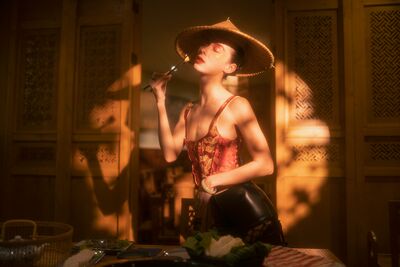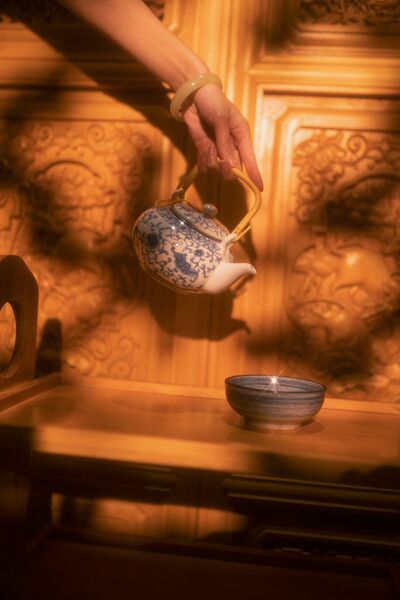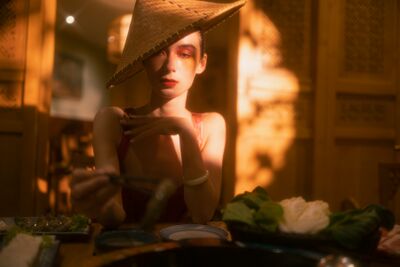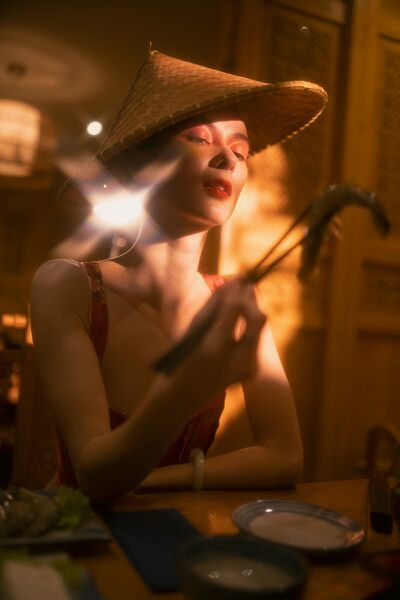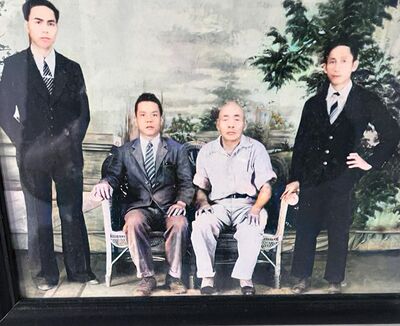Chop Suey - First Chapter Draft: Difference between revisions
MathildeNai (talk | contribs) No edit summary |
MathildeNai (talk | contribs) No edit summary |
||
| Line 16: | Line 16: | ||
Chapter 1: Background | Chapter 1: Background | ||
Around 1920 my great-grandfather from my mother’s side left China to start a new life in Surinam. Back in China a lot of people were being oppressed by the imperial regime, which is why many of them decided to leave the country. My mother thinks he is from Yunan, because she recognised her grandfathers way of preparing and preserving food from a documentary about this district. She told me he spoke mostly Chinese and Surinamese, but he didn’t speak much. | Around 1920 my great-grandfather from my mother’s side left China to start a new life in Surinam. Back in China a lot of people were being oppressed by the imperial regime, which is why many of them decided to leave the country. My mother thinks he is from Yunan, because she recognised her grandfathers way of preparing and preserving food from a documentary about this district. She told me he spoke mostly Chinese and Surinamese, but he didn’t speak much. | ||
[[file:Hakkaopa.jpg|400px]] | |||
Her mother — my grandmother — spoke Surinamese, Javanese and a little bit of Chinese. She only spoke Chinese when she was angry. Growing up in Surinam, however, it was much more important to integrate into the culture so this is when the Chinese language and culture faded into the background and Surinamese culture took over. My mom was unfortunately a product of my grandmother being raped by a Chinese man. | Her mother — my grandmother — spoke Surinamese, Javanese and a little bit of Chinese. She only spoke Chinese when she was angry. Growing up in Surinam, however, it was much more important to integrate into the culture so this is when the Chinese language and culture faded into the background and Surinamese culture took over. My mom was unfortunately a product of my grandmother being raped by a Chinese man. | ||
My mother understands Surinamese, but since she came to the Netherlands when she was 13, she doesn’t speak it much. Growing up in Surinam she says she always thought she looked like her cousins. “They were beautiful,” She says. “They were brown and had curly hair.” When she suddenly got called ‘Sneesie’ — a derogatory term for Chinese in Surinam — was the first time she knew she looked different. | My mother understands Surinamese, but since she came to the Netherlands when she was 13, she doesn’t speak it much. Growing up in Surinam she says she always thought she looked like her cousins. “They were beautiful,” She says. “They were brown and had curly hair.” When she suddenly got called ‘Sneesie’ — a derogatory term for Chinese in Surinam — was the first time she knew she looked different. | ||
“I wanted to be black! With curly hair! Half-Creole. Everyone in Surinam looked like that!” She got a perm because sleek hair wasn’t beautiful back then. She identified mostly with black-Surinamese culture in her younger years. | “I wanted to be black! With curly hair! Half-Creole. Everyone in Surinam looked like that!” She got a perm because sleek hair wasn’t beautiful back then. She identified mostly with black-Surinamese culture in her younger years. | ||
Being called Sneesie combined with knowing her biological father was a rapist, she rejected the Chinese culture and being Chinese almost entirely until she started studying to become an acupuncturist. | Being called Sneesie combined with knowing her biological father was a rapist, she rejected the Chinese culture and being Chinese almost entirely until she started studying to become an acupuncturist. | ||
She’s still unable to eat with chopsticks, however. “It’s embarrassing when you’re the only Asian there and you have to ask for a fork,” | She’s still unable to eat with chopsticks, however. “It’s embarrassing when you’re the only Asian there and you have to ask for a fork,” | ||
My dad — still gotta interview him and will write his text then. | My dad — still gotta interview him and will write his text then. | ||
My mom and dad knew each other and their family’s from when they were little. They had a giant toxic marriage and out came my brother, my sister and me. | My mom and dad knew each other and their family’s from when they were little. They had a giant toxic marriage and out came my brother, my sister and me. | ||
My brother — Reached out to him, not sure if he will want to do an interview. If not I will write his text later. | My brother — Reached out to him, not sure if he will want to do an interview. If not I will write his text later. | ||
My sister identified mostly with South-American culture. She says she doesn’t identify with Surinam culture per say, because to them you’re still seen as a Dutch person or Chinese. Right now she says she doesn’t know what culture she identifies with. “I think [I identify with] none,” | My sister identified mostly with South-American culture. She says she doesn’t identify with Surinam culture per say, because to them you’re still seen as a Dutch person or Chinese. Right now she says she doesn’t know what culture she identifies with. “I think [I identify with] none,” | ||
I asked her what it was like to grow up in the Netherlands as a Chinese person. “I didn’t really get bullied, what bothered me the most was the lack of cultural representation.” She says. | I asked her what it was like to grow up in the Netherlands as a Chinese person. “I didn’t really get bullied, what bothered me the most was the lack of cultural representation.” She says. | ||
Growing up everything and everyone around her was white. Especially the Barbies. She says she started to internalise that and told me about a Chinese looking barbie she had when she was little. This barbie was always the ‘evil stepmom’. “She looked different and she had black hair; so she must’ve been the evil stepmom!” | Growing up everything and everyone around her was white. Especially the Barbies. She says she started to internalise that and told me about a Chinese looking barbie she had when she was little. This barbie was always the ‘evil stepmom’. “She looked different and she had black hair; so she must’ve been the evil stepmom!” | ||
She also tells me about an instance where she looked in the mirror when she was younger and pulled her eyes so that they looked even squintier, saying “I want to have more Chinese eyes like grandpa Ro (this is our dad’s father)!” When I asked her if she ever wanted to be another ethnicity, she answered: “Yeah, Latina or something. Anything but Chinese,” | She also tells me about an instance where she looked in the mirror when she was younger and pulled her eyes so that they looked even squintier, saying “I want to have more Chinese eyes like grandpa Ro (this is our dad’s father)!” When I asked her if she ever wanted to be another ethnicity, she answered: “Yeah, Latina or something. Anything but Chinese,” | ||
In the case of my sister I feel like this, too, points at a sense of unbelonging. She either wanted to look more Chinese so that she would look more like family, or she wanted to not be Chinese at all. | In the case of my sister I feel like this, too, points at a sense of unbelonging. She either wanted to look more Chinese so that she would look more like family, or she wanted to not be Chinese at all. | ||
She ends her answer with the following statement: “I believe your question was ‘What was it like growing up as a Chinese in NL’ but I didn’t grow up as a Chinese person in NL because I know nothing of the culture. I grew up as a… something in the Netherlands. Therefore I am not a Chinese person growing up in the Netherlands and I didn’t have to answer your question,” | She ends her answer with the following statement: “I believe your question was ‘What was it like growing up as a Chinese in NL’ but I didn’t grow up as a Chinese person in NL because I know nothing of the culture. I grew up as a… something in the Netherlands. Therefore I am not a Chinese person growing up in the Netherlands and I didn’t have to answer your question,” | ||
Like we are on trial. | Like we are on trial. | ||
Finally she mentions how she got communicated a lot of prejudices from this country about how she, as an Asian person, wasn’t considered attractive. She dances a lot of salsa and kizomba and the stereotype was that she wasn’t asked to dance a lot because of the stereotype that Chinese people can’t dance. | Finally she mentions how she got communicated a lot of prejudices from this country about how she, as an Asian person, wasn’t considered attractive. She dances a lot of salsa and kizomba and the stereotype was that she wasn’t asked to dance a lot because of the stereotype that Chinese people can’t dance. | ||
Personally I never identified with Chinese culture, because of that inherited defiance against it, so I tried searching for that identity and sense of belonging in all the other east-Asian countries namely Japan and Korea. And I really wanted to look like Beyonce when I was 8-10. | Personally I never identified with Chinese culture, because of that inherited defiance against it, so I tried searching for that identity and sense of belonging in all the other east-Asian countries namely Japan and Korea. And I really wanted to look like Beyonce when I was 8-10. | ||
Growing up I was bullied for being Chinese. We lived in a very small, white village for a couple of years and it was the first time I experienced racism. I think I was around 8. | Growing up I was bullied for being Chinese. We lived in a very small, white village for a couple of years and it was the first time I experienced racism. I think I was around 8. | ||
I got called ‘poop’ and asked if I was even able to see out of my eyes? One time a red-headed boy with freckles insisted on calling me Sars every time he saw me. Following my brothers’ and sisters’ advice I told him to “Shut up, traffic light!”. He never looked at me again. | I got called ‘poop’ and asked if I was even able to see out of my eyes? One time a red-headed boy with freckles insisted on calling me Sars every time he saw me. Following my brothers’ and sisters’ advice I told him to “Shut up, traffic light!”. He never looked at me again. | ||
I remember one instance that I feel really shaped my self-worth well into my teenage years. I was around 9, same small village, and it was valentine’s day. The class had this stupid idea where boys had to leave the classroom and while they were gone us girls had to put our names on their desks if we had a crush on them. I didn’t really have a crush on anyone, but luckily a classmate had some advice for me. “Put your name on his desk! He’s also brown,” She referred to another little boy who was probably something like Indian. | I remember one instance that I feel really shaped my self-worth well into my teenage years. I was around 9, same small village, and it was valentine’s day. The class had this stupid idea where boys had to leave the classroom and while they were gone us girls had to put our names on their desks if we had a crush on them. I didn’t really have a crush on anyone, but luckily a classmate had some advice for me. “Put your name on his desk! He’s also brown,” She referred to another little boy who was probably something like Indian. | ||
From then on until 17 I felt foreign. I had the same feeling my sister had. White guys can only like white girls, Chinese guys can only like real Chinese girls and black guys only like black girls. So what category did I fit in? | From then on until 17 I felt foreign. I had the same feeling my sister had. White guys can only like white girls, Chinese guys can only like real Chinese girls and black guys only like black girls. So what category did I fit in? | ||
I had to be more Asian. Like a real Asian. Asians had sleek hair and mine was wavy (frizzy back then because I didn’t know how to deal with it) so I styled my hair everyday. Real Asian beauty standards were to be as white as possible, so I wore 50 spf sunscreen and didn’t go into the sun. I did this until I was around 23. I was tired of fighting who I am. | I had to be more Asian. Like a real Asian. Asians had sleek hair and mine was wavy (frizzy back then because I didn’t know how to deal with it) so I styled my hair everyday. Real Asian beauty standards were to be as white as possible, so I wore 50 spf sunscreen and didn’t go into the sun. I did this until I was around 23. I was tired of fighting who I am. | ||
Like my sister said: “It’s cool to look like us; because we look different and unique. I don’t want to look like other people,” | Like my sister said: “It’s cool to look like us; because we look different and unique. I don’t want to look like other people,” | ||
I am now revisiting Chinese culture within the context of my family and us being removed from this culture. Last march I decided to work in a Chinese giftshop so that I could have an introduction into Chinese culture. For me this was an approachable place where I could dip my toe into China. | I am now revisiting Chinese culture within the context of my family and us being removed from this culture. Last march I decided to work in a Chinese giftshop so that I could have an introduction into Chinese culture. For me this was an approachable place where I could dip my toe into China. | ||
My job was to tell unsuspecting tourists all the mythical tales that belonged to the jade circle pendant. Or the Buddha with the scepter in hand. Or how the Daruma is actually Japanese but it’s okay! | My job was to tell unsuspecting tourists all the mythical tales that belonged to the jade circle pendant. Or the Buddha with the scepter in hand. Or how the Daruma is actually Japanese but it’s okay! | ||
Working there made me feel simultaneously more connected to the culture and removed from the culture. I felt like I belonged to the cliché and I liked it, but then my bubble burst when I wasn’t able to read a Chinese character but my white colleague who studies China studies could. I felt a sense of shame when Chinese customers asked me a question in Mandarin and I had to tell them I didn’t understand a word. The same feeling I had when I enter a Chinese restaurant. | Working there made me feel simultaneously more connected to the culture and removed from the culture. I felt like I belonged to the cliché and I liked it, but then my bubble burst when I wasn’t able to read a Chinese character but my white colleague who studies China studies could. I felt a sense of shame when Chinese customers asked me a question in Mandarin and I had to tell them I didn’t understand a word. The same feeling I had when I enter a Chinese restaurant. | ||
I liked it when my boss said “Of course you like the humidity, you’re a Hakka Chinese!” It made me feel all giddy inside, like I belong somewhere. That’s when my curiosity into my family history awakened. | I liked it when my boss said “Of course you like the humidity, you’re a Hakka Chinese!” It made me feel all giddy inside, like I belong somewhere. That’s when my curiosity into my family history awakened. | ||
Revision as of 17:45, 5 December 2022
Intro
Chop Suey is an inauthentic Chinese dish. The exact origin is unknown but is believed to be an American Chinese invention, although it is also a commonly know dish in many other mixed Chinese cuisine. Also known as Tjap Tjoy in Surinamese-Chinese cuisine. Which is my heritage.
I identify with Chop Suey or Tjap Tjoy. I am also regarded as an inauthentic Chinese. In this study I will be exploring my background, my history, my experiences, as a Chinese person growing up in and with different cultures. The result of this thesis will be a series of photographs exploring the complicated relationship with my Chinese heritage.
The curiosity into exploring the complicated dynamic me and my family have with our Chinese heritage got fuelled last year. I got drawn exclusively to photographers from East-Asian descent and my recent work featured mostly Asian models. Last year I had the idea to use the rice hat — an object commonly used to ridicule Asians — take back the symbolism and turn it into a fashionable object. This was also an attempt to get closer to my Chinese heritage.
This tremendous urge to suddenly seek out that connection when I’ve never had this need before, made me think about my family’s inherited conflicted relationship to our ancestry and history of separating ourselves from China.
Chapter 1: Background
Around 1920 my great-grandfather from my mother’s side left China to start a new life in Surinam. Back in China a lot of people were being oppressed by the imperial regime, which is why many of them decided to leave the country. My mother thinks he is from Yunan, because she recognised her grandfathers way of preparing and preserving food from a documentary about this district. She told me he spoke mostly Chinese and Surinamese, but he didn’t speak much.
Her mother — my grandmother — spoke Surinamese, Javanese and a little bit of Chinese. She only spoke Chinese when she was angry. Growing up in Surinam, however, it was much more important to integrate into the culture so this is when the Chinese language and culture faded into the background and Surinamese culture took over. My mom was unfortunately a product of my grandmother being raped by a Chinese man.
My mother understands Surinamese, but since she came to the Netherlands when she was 13, she doesn’t speak it much. Growing up in Surinam she says she always thought she looked like her cousins. “They were beautiful,” She says. “They were brown and had curly hair.” When she suddenly got called ‘Sneesie’ — a derogatory term for Chinese in Surinam — was the first time she knew she looked different.
“I wanted to be black! With curly hair! Half-Creole. Everyone in Surinam looked like that!” She got a perm because sleek hair wasn’t beautiful back then. She identified mostly with black-Surinamese culture in her younger years.
Being called Sneesie combined with knowing her biological father was a rapist, she rejected the Chinese culture and being Chinese almost entirely until she started studying to become an acupuncturist.
She’s still unable to eat with chopsticks, however. “It’s embarrassing when you’re the only Asian there and you have to ask for a fork,”
My dad — still gotta interview him and will write his text then.
My mom and dad knew each other and their family’s from when they were little. They had a giant toxic marriage and out came my brother, my sister and me.
My brother — Reached out to him, not sure if he will want to do an interview. If not I will write his text later.
My sister identified mostly with South-American culture. She says she doesn’t identify with Surinam culture per say, because to them you’re still seen as a Dutch person or Chinese. Right now she says she doesn’t know what culture she identifies with. “I think [I identify with] none,”
I asked her what it was like to grow up in the Netherlands as a Chinese person. “I didn’t really get bullied, what bothered me the most was the lack of cultural representation.” She says.
Growing up everything and everyone around her was white. Especially the Barbies. She says she started to internalise that and told me about a Chinese looking barbie she had when she was little. This barbie was always the ‘evil stepmom’. “She looked different and she had black hair; so she must’ve been the evil stepmom!”
She also tells me about an instance where she looked in the mirror when she was younger and pulled her eyes so that they looked even squintier, saying “I want to have more Chinese eyes like grandpa Ro (this is our dad’s father)!” When I asked her if she ever wanted to be another ethnicity, she answered: “Yeah, Latina or something. Anything but Chinese,”
In the case of my sister I feel like this, too, points at a sense of unbelonging. She either wanted to look more Chinese so that she would look more like family, or she wanted to not be Chinese at all.
She ends her answer with the following statement: “I believe your question was ‘What was it like growing up as a Chinese in NL’ but I didn’t grow up as a Chinese person in NL because I know nothing of the culture. I grew up as a… something in the Netherlands. Therefore I am not a Chinese person growing up in the Netherlands and I didn’t have to answer your question,”
Like we are on trial.
Finally she mentions how she got communicated a lot of prejudices from this country about how she, as an Asian person, wasn’t considered attractive. She dances a lot of salsa and kizomba and the stereotype was that she wasn’t asked to dance a lot because of the stereotype that Chinese people can’t dance.
Personally I never identified with Chinese culture, because of that inherited defiance against it, so I tried searching for that identity and sense of belonging in all the other east-Asian countries namely Japan and Korea. And I really wanted to look like Beyonce when I was 8-10.
Growing up I was bullied for being Chinese. We lived in a very small, white village for a couple of years and it was the first time I experienced racism. I think I was around 8.
I got called ‘poop’ and asked if I was even able to see out of my eyes? One time a red-headed boy with freckles insisted on calling me Sars every time he saw me. Following my brothers’ and sisters’ advice I told him to “Shut up, traffic light!”. He never looked at me again.
I remember one instance that I feel really shaped my self-worth well into my teenage years. I was around 9, same small village, and it was valentine’s day. The class had this stupid idea where boys had to leave the classroom and while they were gone us girls had to put our names on their desks if we had a crush on them. I didn’t really have a crush on anyone, but luckily a classmate had some advice for me. “Put your name on his desk! He’s also brown,” She referred to another little boy who was probably something like Indian.
From then on until 17 I felt foreign. I had the same feeling my sister had. White guys can only like white girls, Chinese guys can only like real Chinese girls and black guys only like black girls. So what category did I fit in?
I had to be more Asian. Like a real Asian. Asians had sleek hair and mine was wavy (frizzy back then because I didn’t know how to deal with it) so I styled my hair everyday. Real Asian beauty standards were to be as white as possible, so I wore 50 spf sunscreen and didn’t go into the sun. I did this until I was around 23. I was tired of fighting who I am.
Like my sister said: “It’s cool to look like us; because we look different and unique. I don’t want to look like other people,”
I am now revisiting Chinese culture within the context of my family and us being removed from this culture. Last march I decided to work in a Chinese giftshop so that I could have an introduction into Chinese culture. For me this was an approachable place where I could dip my toe into China.
My job was to tell unsuspecting tourists all the mythical tales that belonged to the jade circle pendant. Or the Buddha with the scepter in hand. Or how the Daruma is actually Japanese but it’s okay!
Working there made me feel simultaneously more connected to the culture and removed from the culture. I felt like I belonged to the cliché and I liked it, but then my bubble burst when I wasn’t able to read a Chinese character but my white colleague who studies China studies could. I felt a sense of shame when Chinese customers asked me a question in Mandarin and I had to tell them I didn’t understand a word. The same feeling I had when I enter a Chinese restaurant.
I liked it when my boss said “Of course you like the humidity, you’re a Hakka Chinese!” It made me feel all giddy inside, like I belong somewhere. That’s when my curiosity into my family history awakened.

